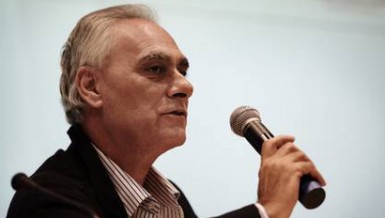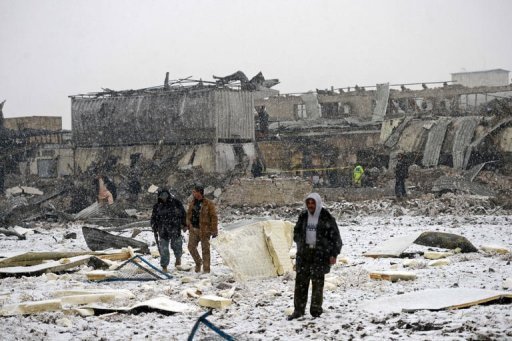
By James M. Dorsey
Ultra-conservative clerics are condemning football as a Jewish and Christian tool undermining Islamic culture as millions of Muslims worldwide tune in to the 2014 World Cup in Brazil.
The condemnations revive an enduring debate among conservatives and militants about the football’s integrity. They constitute one side of a jihadi and Salafi argument, arch conservatives seeking to closely emulate life at the time of the Prophet Mohammed and his immediate successors.
On the other side are some of the world’s most prominent militant Islamists, including the late Osama Bin Laden, Hamas’ Gaza leader Ismail Haniyeh and Hezbollah chief sheikh Hassan Nasrallah, all avid football fans. They recognize the sport’s bonding and recruitment qualities. The Islamic State of Iraq and Syria (ISIS), the jihadist group making advances in Iraq, earlier this year used football as a recruitment tool.
Saudi Sheikh Abdel Rahman Al-Barrak, who is close to the Saudi royal family, recently issued a fatwa saying football “played according to (accepted international rules) has caused Muslims to adopt some of the customs of the enemies of Islam, who are (preoccupied with) games and frivolity.”
The fatwa responded to a reader’s query on his website on how the faithful should view fans who admire foreign players.
He cautioned that football was responsible for “abominable and corrupt acts,” including befriending and admiring infidels, sparking hostility between supporters of different teams, cursing, profiteering and insulting others when one’s team wins.
“In light of all this, liking and glorifying football is tantamount to engaging in a public abomination and encouraging it. It distracts sectors of society – men and women, young and old – from important matters, both religious and non-religious, and busies them with trivial matters that do not benefit the nation but only lead to a waste of energy and time. This means that it is forbidden to praise or glorify infidel players,” Sheikh Al-Barrak ruled.
His views echo those of other militant clerics, including Sheikh Suleiman Al-Alwan, a Saudi cleric nicknamed Al Qaeda’s mufti currently serving a 15-year prison sentence for endorsing suicide attacks.
“Football is a Masonic game meant to distance Muslims from their religion and faith, and most of those who follow (football matches) are loyal to the infidels… A man who watches a game, God forbid, is watching deviant criminals and sinful infidels, even if they are Muslims,” Sheikh Al-Alwan argued in a fatwa two years ago. He warned that refereeing posed a serious problem because it implemented man-made rules rather than God’s law.
Sheikh Al-Barrak last year also condemned Muslim governments for investing in football and wanting to host events like the World Cup, a swipe at both his own government and Qatar, the host of the 2022 tournament.
Sheikh Al-Mutairi warned late last year that the Jews had been “successful in preoccupying the Muslim youth… with the most inane matters” conforming with The Protocols of the Elders of Zion, a 19th century anti-Semitic plot detailing an alleged Jewish plot to control the world.
Sheikh Al-Alwan charged that “the Jews, the Christians, and their hypocritical, mercenary lackeys have invested great efforts in cutting the nation off from its glorious history. They want Muslim youths to fumble about in the darkness of Western culture, which is promoted by the sinful media.”
Jihadist and Salafi football advocates recognise football’s recruiting capabilities, encouraging camaraderie and reinforcing militancy among those who have already joined.
ISIS published a video earlier this year alleging a masked Portuguese fighter in Syria was former French international, Lassana Diarra, formerly of British premier league club Arsenal.
The video exploited Celso Rodrigues Da Costa’s physical likeness to that of Diarra. Voice analysis indicated however the man was Da Costa, who had lived in East London and may have attended youth coaching sessions at Arsenal.
A caption under the video posted on ISIS associated website FiSyria.com read: “A former football player – Arsenal of London – who left everything for jihad.”
Last October, Burak Karan, a promising German-Turkish footballer, was killed during a Syrian military raid on anti-regiome rebels near the Turkish border.
Palestinian suicide bombers in Israel traced their roots a decade ago to a West Bank football team, with the 2004 Madrid train bombers playing together. Several Saudi players joined the Iraqi anti-American jihad following a fatwa denouncing football as a game of the infidels.
Three years ago, Russian authorities arrested three men on charges of conspiring to blow up the high speed Sapsan railway linking Moscow and St Petersburg. The three were childhood friends with roots in the northern Caucasus, a hotbed of Islamist militancy, where they played football together.
Karan and Da Costa are in a category of players who were born in or migrated to Europe including Yann Nsaku and Nizar ben Abdelaziz Trabelsi. These youngsters radicalized individually unlike the Hamas, Madrid bombers or Saudi players who turned militant as part of a group.
Nsaku, a Congolese-born convert to Islam and former Portsmouth FC youth centre back, was one of 11 converts arrested in France a year ago for “suspected Islamic terrorist plotting of anti-Semitic attacks”. Police said the group aimed to spark a “war across France” to impose Islamic law.
At 19, he signed with Portsmouth from Cannes FC but never made it into the 2008 FA Cup winners’ first team. His promising career ended in 2011 after suffering a knee injury.
Trabelsi, a Tunisian who played for in Germany, was arrested and convicted in Belgium a decade ago on charges of illegal arms possession and being a member of a private militia. Trabelsi was sentenced to ten years in prison.
In all cases, football proved to be a fruitful grooming if not recruiting ground even if Karan, Nsaku and Trabelsi were not recruited off the pitch but instead reached out to individuals or groups who could help them join a militant cause.
James M. Dorsey is a Senior Fellow at the S. Rajaratnam School of International Studies (RSIS), Nanyang Technological University. He is also co-director of the University of Würzburg’s Institute for Fan Culture, and the author of The Turbulent World of Middle East Soccer blog and a forthcoming book with the same title




